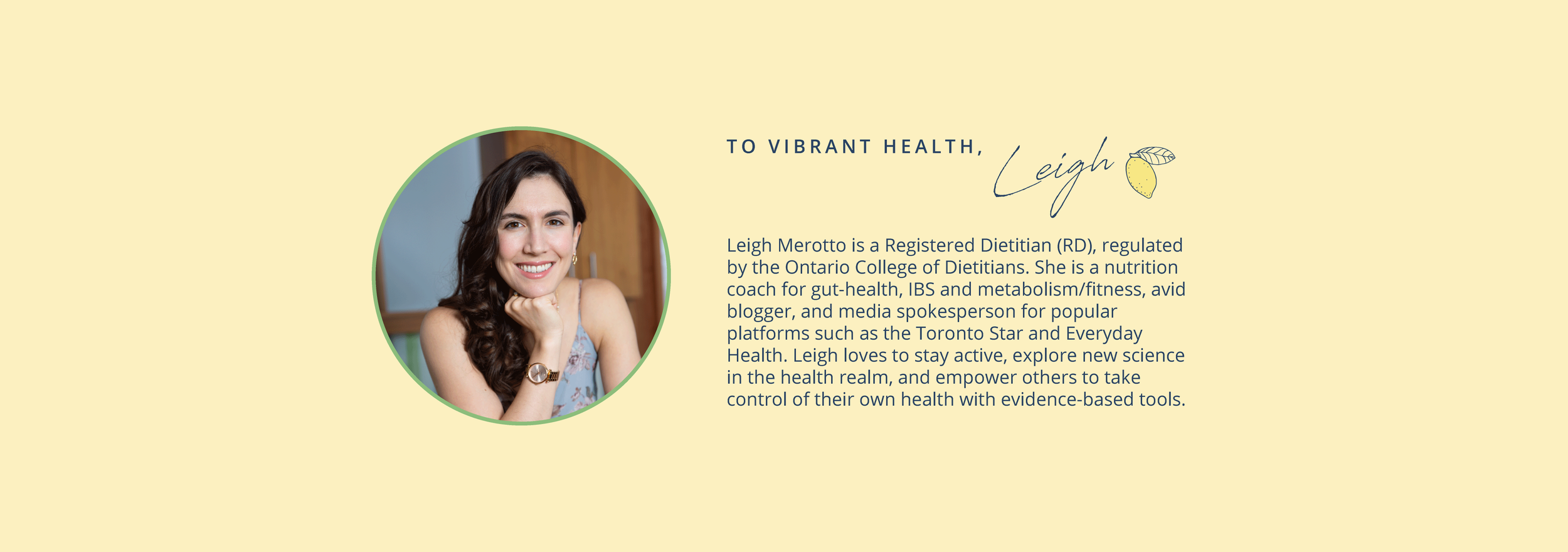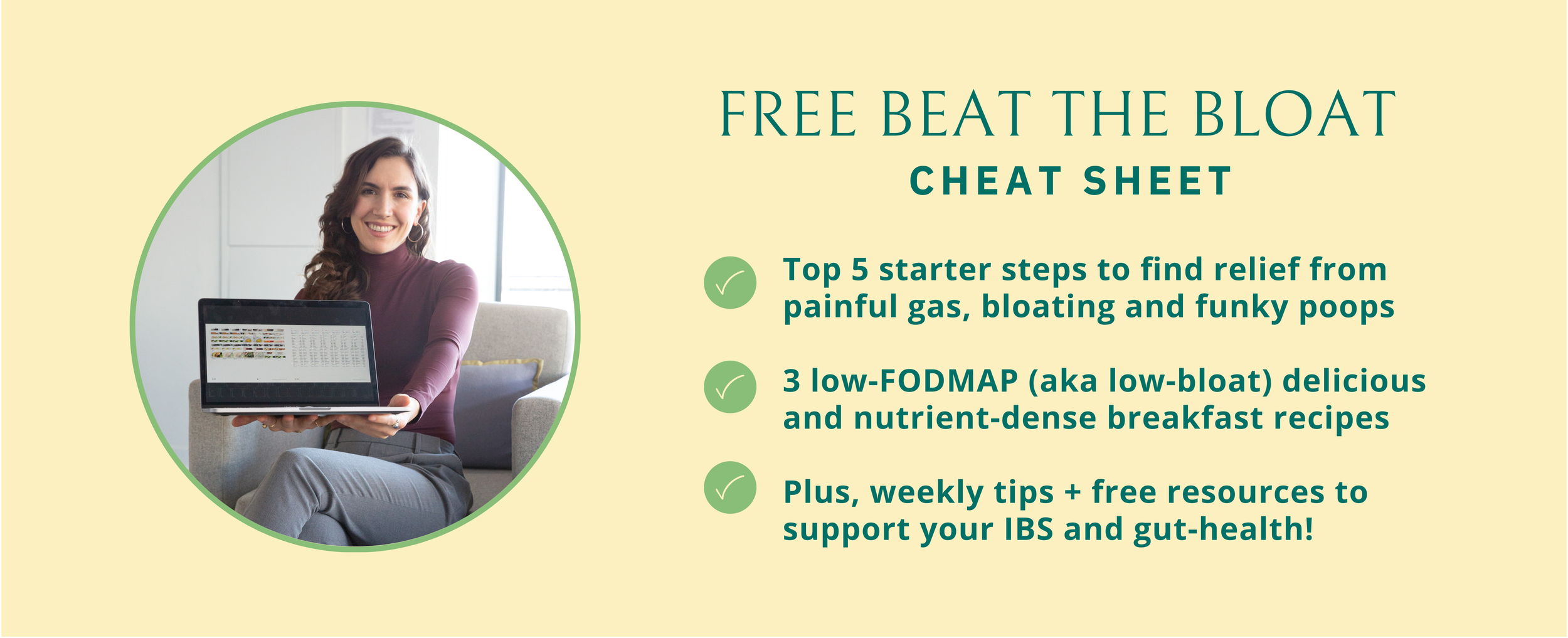Beat the Bloat: Why You're Bloated and the End of Your Workday (And How You Can Help)
Whether you’re back to the office or still working from home, long work days can mean worsened bloat. Why?
Well, for starters, let’s define bloating. Bloating refers to a sensation of air/space or an inflated balloon in your abdomen. It can be linked to ‘distention’ which is a noticeable size increase in the girth of your abdomen.
Put simply, bloating can be complex and there may be multiple things going on if you are experiencing a lot of painful, uncomfortable bloating.
But if you’re finding you’re often bloated by the end of your workday, here are some potential culprits that I often see in my practice:
Lack of movement/sedentary lifestyle: are you sitting at a desk all day?
High stress levels: due to work stress, lack of time, poor sleep
Boredom or stress eating/snacking: eating your food while working, and constantly getting up for more snacks to help the time pass quicker
Eating outside foods/ snacks/take-out meals: going out for food more than you should, or would like to
Distracted eating: ie. rushing to chomp down your giant salad before your 1pm Zoom meeting!
All of these culprits can lead to our gut functioning less than optimal, slowed motility (aka movement in our digestive tract), more gas and distention, and yes more bloating.
If this is a common problem for you, here are some strategies to help.
1. Incorporate Movement Into Your Day
Exercise has been proven to help increase gas clearance in the digestive tract (1). Finding time in your day to incorporate movement can seem daunting but this can be more easily incorporated into your daily activities than you think! Some simple activities you can do are morning or lunchtime walks or workouts, utilizing standing desks or by simply setting reminders to get up every 20 minutes.
2. Prioritize Mindful Eating
Mindful eating can be a quite difficult practice, especially during those busy workdays. It requires having a strong presence in the eating experience, and minimizing distractions. A great place to start is to choose one meal per day that you can have away from your desk. While eating, slow down and take time to chew. It can help promote a more satisfying and full feeling in your body and brain to help keep you fueled for the rest of the work day.
Oftentimes we find that when we are not able to have balanced meals throughout the workday that can be the perfect way for those sugar cravings to start kicking in as well as our blood sugar can fluctuate so dramatically.
You may want to read: Strategies to Manage Sugar Cravings.
3. Address Your Stress
Oftentimes stress and work are two terms that seem to pair in harmony with each other. It is so easy to turn to food when we are stressed in the workplace to help us manage. When our body is stressed it releases hormones such as cortisol which can be a key target in contributing to our bloating and when we add emotional eating to the mix it can further exacerbate the issue in our digestive track.
There are many simple ways to manage stress that don't result in turning to food. Activities such as journaling, walking, and talking to a coworker are great de-stressers. This is something I talk about a lot with my clients!
4. Meal Planning & Prepping
Having nutrient dense, gut-friendly meals and snacks prepared and ready to go can be a very beneficial practice to implement so you don't turn to whatever is convenient or ordering out/picking up food. Implementing a weekly/biweekly preparation into your schedule can make all the difference in what you consume during the work day!
Meal prepping is incredibly important as it allows you more awareness as to what is going into your body, and helps ensure you get enough nutrients essential for digestive-health such as fiber, potassium, magnesium and zinc. It also allows you to practice mindfulness towards the foods you are making and therefore will be a more enjoyable experience come time to eat them!
Want to save TIME, STRESS and MONEY while optimizing your gut-health and reducing symptoms with a proven meal planning and prepping system? Get access to my Gut-Friendly Diet Meal Planning Workshop + Resource Bundle!
5. Determine Any Deeper Issues
Bloating can be complex, and can be due to unmanaged IBS/SIBO, lack of fibre and potassium in the diet, constipation, sedentary lifestyle, medical conditions and more. It’s important to know what the underlying contributors are, in order to help remedy it.
6. Work With a Specialized Registered Dietitian
By working with a Registered Dietitian that specializes in gut-health, functional bloating and IBS, you can more quickly uncover the root issues, and have a support team to help you build healthy habits to support optimal digestion.

BE SURE TO FOLLOW ME HERE
References:
Villoria, A., Serra, J., Azpiroz, F., & Malagelada, J. R. (2006). Physical activity and intestinal gas clearance in patients with bloating. The American journal of gastroenterology, 101(11), 2552–2557. https://doi.org/10.1111/j.1572-0241.2006.00873.x







